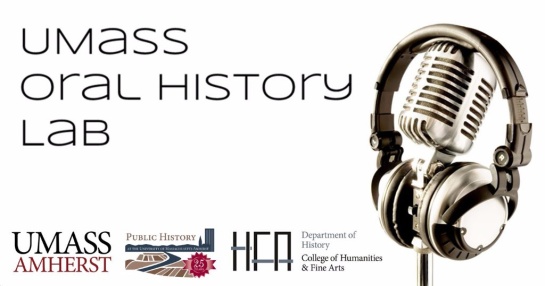Shakti Castro, Public History M.A. Candidate, UMass Amherst
Next Wednesday, November 30th, the UMass Oral History Lab will be hosting a workshop at the UMass Center in Springfield, MA. I am so excited to take part in helping to introduce this democratic methodology to community members and professionals in the Springfield area! We hope to expound on the tremendous possibilities of oral history for documenting and sharing often overlooked histories, as well its use in connecting people and communities. This all day event will (attempt to) define what oral history is, teach methods and best practices, and discuss the ethics surrounding the recording of life histories.

This crash course in Springfield is a wonderful chance for us, faculty and attendees alike, to explore what it means to tell a story about a community, place, or event, and how those stories help to shape historical perspective. It’s also a great opportunity for those interested in using oral history interviews in their research or nonprofit work, or those looking to preserve their own family’s history. When I came to the University of Massachusetts Amherst, it was with the intention of learning oral history methods and theories to complement my field work, as well as helping to grow the university’s new Oral History Lab. Because of this, I am especially excited to speak about oral history ethics, and ways to approach interviewing within marginalized communities as a collaborator. Michael Frisch, the famous oral historian, coined the now-famous phrase “shared authority” to refer to the power dynamic that should arise, organically, from an interview session. As my oral history work is based primarily in the Puerto Rican community, I am sensitive to sharing the stories of people who’ve been marginalized because of their race, class, and “national” origin as well as language spoken. Frisch’s concept of sharing authority, as well as the best practices established by the Oral History Association, are what guide me as a public historian of the Puerto Rican Diaspora. At the UMass Oral History Lab, we are aiming to be a partner in collaboration with other departments, faculty, students, staff, and the community.
We hope you’ll join us for a day spent on thinking through how we tell and share history and, of course, why we do it! The UMass Oral History Lab’s Oral History Crash Course will take place Wednesday November 30, 2016, 10am-5pm at the UMass Center in Springfield*. It is open to the public. Registration fee is $45, and includes lunch.
This workshop is made possible by the generosity of Dr. Charles K. Hyde, a great supporter of many of UMass Amherst’s Public History events and projects. Faculty leading the workshop include professors and graduate students in the UMass history department working extensively with the UMass Oral History Lab:
You can read more about this exciting workshop here and register here.
Emily Redman is a historian of science at the University of Massachusetts–Amherst, focusing on the political and social history of 20th century mathematics education reform in the United States. Her in-progress book manuscript, The Math Mafia: How a Persistent Group of Reformers Standardized American Education, utilizes oral histories conducted for the project as well as other oral histories from the archives. Prior to arriving at UMass, Emily worked at the Regional Oral History Office (now Oral History Center) at the University of California—Berkeley, where she conducted oral history interviews with prominent scientists and helped lead the organization’s Oral History Summer Institute.
Sam Redman is an Assistant Professor of History at the University of Massachusetts Amherst and the founder of the UMass Oral History Lab. He teaches modern US history, public history, and oral history courses at UMass. Before coming to Massachusetts, he worked at the Oral History Center of the University of California Berkeley where he managed a variety of oral history projects including the Rosie the Riveter / World War II Home Front Oral History Project, Bay Bridge Oral History Project, and Japanese Americans Confinement Sites Oral History Project. He is the author of Bone Rooms: From Scientific Racism to Human Prehistory in Museums published by Harvard University Press in 2016.
Shakti Castro is a Master’s candidate in the Public History program at UMass Amherst. Her work examines Puerto Rican family relationships in the neoliberal city, as well as the long-time public history practices of communities of color. She has used oral history as a key part of her research methodology for the last several years, recording over 30 oral history interviews at The Center for Puerto Rican Studies at CUNY. She holds a Bachelor’s degree in media studies and English literature from Hunter College.
Jason Higgins studies the American War in Vietnam, as a Ph.D student in American History, and works with the Oral History Lab at UMass Amherst. His research involves veteran experiences during the Vietnam War era, Civil Rights, and Disability Rights, and his dissertation addresses the problems of reintegration after war including trauma, disability, and incarceration. Higgins has been conducting oral history interviews with combat veterans for the past five years. He worked at Oklahoma Oral history Research Program in 2014 and gained formal training in oral history methodology. He earned a master of arts in English from Oklahoma State University and a Bachelor’s in history and English from University of Arkansas at Monticello.
*The UMass Center in Springfield is located at 1500 Main St, Springfield, MA 01103, Springfield, Massachusetts
For more information, please contact Dr. Samuel Redman at sredman@history.umass.edu